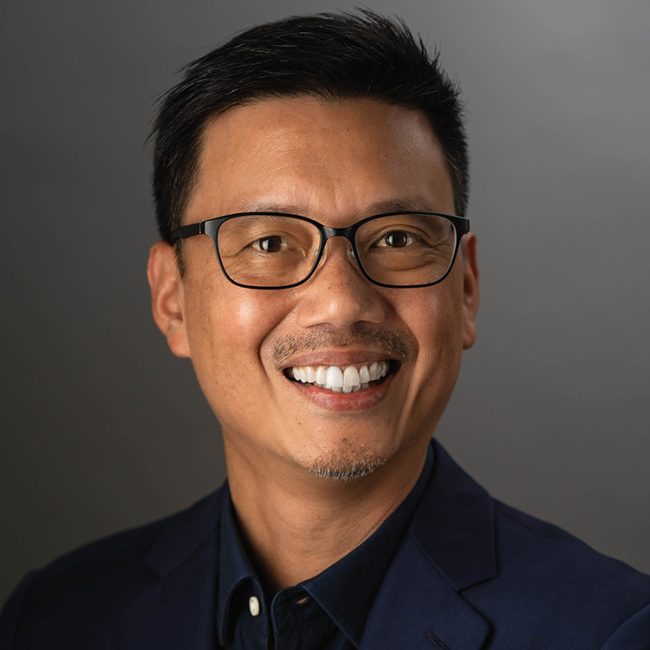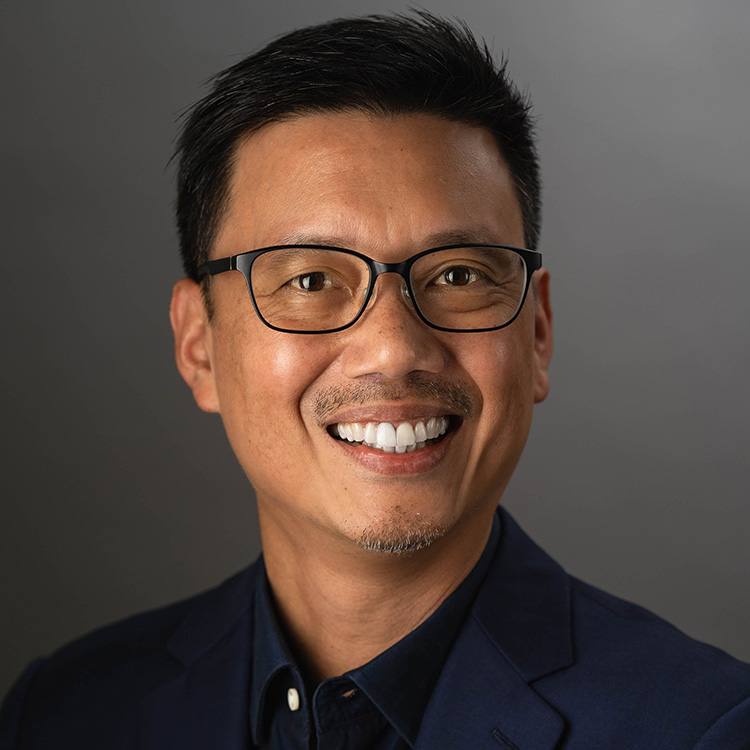Curated conversations with data and AI for social impact leaders on their career journeys
Pathways to Impact is a series of conversations with data for social impact leaders exploring their career journeys. Perry Hewitt, Chief Strategy Officer of data.org, spoke with Kevin Teo, Chief Technology Officer and Head of AVPN’s ImpactCollab platform, which aims to facilitate the identification of trustworthy and impactful impact organizations across Asia, enabling effective philanthropic giving.
You had a wide range of diverse work experiences before pursuing a career in social impact. What led you to this work?
My career started in computer science, so I naturally went into the tech sector, in startups. That spanned a period of eight and a half years across numerous companies—some succeeded, some failed. The transition towards social impact occurred when I had the realization that, despite the energetic and innovative nature of the startup community, for me, it was missing an essential ingredient around purpose. That led me to pursue an alternative path.
I believe that everything happens for a reason. Right around that time, a door opened by way of the Global Leadership Fellows Program with the World Economic Forum. The program provided an opportunity to get engaged in social entrepreneurship. The subcommittee I was part of looked at social entrepreneurship in East and Southeast Asia. The role entailed bringing these passionate and innovative social entrepreneurs into the broader World Economic Forum convenings. Our goal was to enable the cross-pollination of ideas between global CEOs and leaders and the social entrepreneurs driving change on the ground.
Forging those connections was a hugely invigorating experience. And it was such an exciting time to be doing this work, with Mohammad Yunus just getting recognized for his results in microfinance.
I took all that as a very clear sign to contemplate a career shift toward social impact.
In most of Asia, the dominant language is not English: it’s Chinese, Japanese, or something else. So when Asia-based SIOs are trying to fundraise, often they are translating themselves into English with a particular donor profile in mind. That approach impairs communication to all the other potential local supporters who could appreciate the nature of their work.
Kevin Teo Chief Technology Officer and Head of ImpactCollab AVPN
You’ve held many roles at AVPN, and most recently have been leading the ImpactCollab there. What are you working on with data and AI?
At AVPN, we start with the premise that we are essentially surrounded by capital. When we talk about engaging in social impact, it necessarily means deploying that capital to support non-profit organizations to deliver on their mission and to grow.
The challenge is connecting the two worlds: the abundance of capital needs to find a fit with social impact organization (SIO) leaders, who all need capital to support their work. This is a shared need for both nonprofit organizations and social entrepreneurs.
We ask ourselves: how do we best engage that capital? How do we get the people making decisions around capital to take notice of the important work happening in social impact? How do leaders at SIOs, from both data and communication perspectives, gather and present the right information to attract funding?
We have found that in many instances, the SIOs’ case for support is constructed with just one funder in mind, like the Gates Foundation. Hundreds, if not thousands, of other possible, well-resourced supporters would be interested in the nature of an SIO’s work—so we think a lot about how we gather the data to get all the right pieces of information to the right audiences so capital can flow.
Bridging this gap between the organizations that need the resources and the people who actually have the resources is what we’re focused on with ImpactCollab.
Here’s another place we’re seeing a role for data and AI: language. Within the Asian context, we’ve got an additional layer of challenge around languages. In most of Asia, the dominant language is not English: it’s Chinese, Japanese, or something else. So when Asia-based SIOs are trying to fundraise, often they are translating themselves into English with a particular donor profile in mind. That approach impairs communication to all the other potential local supporters who could appreciate the nature of their work.
Next, imagine the people with the wealth being subdivided into different communities of culture and language with all the nuance that entails.
That’s where LLMs, in particular, can play an interesting and important role. First, they allow a different way to navigate the taxonomy of areas of social impact. For example, in this sector, we sometimes use very specific terms to describe our work. If you’re in climate-related work, you’ll talk about mitigation and adaptation. To the person on the street, those terms are just jargon. That person would say, “I want to do something for the environment,” but they might not frame it in terms of mitigation or adaptation.
An LLM actually allows for natural language to be used, for someone to present an interest and then connect to a potential opportunity to act or support. With technology, you can even layer the language translation layer on top of that. So that’s something we’re looking to build quite extensively into ImpactCollab.
It’s great because a lot of these technologies are actually now available out of the box. With so many AI competitors, we don’t have to build these capabilities from scratch; we’re just tapping into what’s being produced at such a fast pace. We want to ensure we do this work responsibly and also take full advantage of emerging technology to deploy capital to social impact areas where it’s needed most.
Part of the Pathways to Impact series
Were there any blockers to your career entry or career progression?
I’m both a Stoic and an optimist, so when something crops up in my path, I tend to take that as a sign and a challenge rather than as a barrier.
Over the years, I have embraced the challenge of adapting to new cultures. I grew up in Singapore, went to the UK for my undergraduate degree, and then to the US for grad school.
I am very grateful for those experiences: diving into what people were like in each region and local community, and learning what motivates them—how they work. I also saw that as a way to develop myself personally, and to see life from different perspectives.
What community of people or resources bolsters your work?
For me, it’s always been the social entrepreneur community. And for me, that’s less a formal affiliation or group, and more my community of friends and colleagues who have the social entrepreneur mindset.
Very different people can embody this mindset, wearing different hats and holding different titles. You can find them in a nonprofit, in government, or in a corporation. My personal affinity is to the group that thinks in a socially entrepreneurial fashion. That’s the group of friends and stakeholders that energizes me, and that I proactively look to cultivate over time.
Thinking longer term, I always want to be active in this space—even as I grow old and retire. I can’t imagine myself doing nothing. I want to be surrounded by people with the social entrepreneur mindset, intent on change. I intentionally cultivate a network of my peers, and also those who are 20 and 30 years younger than I am, to ensure I can stay engaged and connected to this work.
Given the breadth of your education and roles you’ve held, you possess a wide range of skills beyond technical ones. Which skill has offered the greatest return in your career?
I’ve mentioned Stoicism before—it’s a mindset and philosophy that has hugely benefited me: Keeping an open mind around different perspectives, especially when you’re in times of high stress or pressure.
We at AVPN often find ourselves in those situations because we work among Type A employees who charge ahead. Sometimes, that pressure can build up. But you don’t want it to become a conflict. That can happen without cultivating a more accommodating mindset, where you seek to understand why people said what they did, or why people reacted the way they did.
I rely on the Stoic mindset, which I try to inculcate in the team. It has benefited me tremendously, as I appreciate a broad range of perspectives and approaches. Those different approaches add value to my individual contribution, the organization’s work, and overall, they make us more effective as humans.
Now, with AI, we can facilitate better translation, as well as a much richer understanding of semantics between cultures and practices. We're able to expand from that very thin slice into a much broader view.
Kevin Teo Chief Technology Officer and Head of ImpactCollab AVPN
What advice do you have for someone new to the field who is interested in doing this work?
I’d suggest first exploring volunteering—dipping their toe into the social impact space, assuming they are holding some other job. Engaging as a volunteer is an excellent introduction to some of the practical realities on the ground and the multifaceted challenges that are typically at play.
It’s also important for them to reflect upon what makes sense for themselves and the issues that speak to them on a very personal basis. I’ve found that this has to work for each of us, personally, to be sustained on this journey of discovering our own purpose and place in society and life.
To take Singapore as a context, we’ve created a very robust process of getting young people through school and then into jobs. Once they have those first roles, that’s typically when they get to contemplate what it might mean to work at organizations on the ground that serve a broader purpose beyond individual self-interest. It’s then that they engage in a peer group to share experiences and learn together. It doesn’t matter whether you’re a fresh grad, a mid-career person, or even a retiree—finding what compels you is useful to unpack as you begin to work in the social sector.
What is the next big thing you see in data and AI for social impact?
I’ll focus on data and AI enabling a major cultural shift. In the Asian context, where AVPN focuses, there is such diversity of cultures, practices, and languages. The shift I anticipate and hope to see is a greater melding of cultures and mindsets across the region. As I said, so much of this work and communication is translated into an English medium, and as a result, we are seeing only a very thin slice of what is actually happening on the ground.
Now, with AI, we can facilitate better translation, as well as a much richer understanding of semantics between cultures and practices. We’re able to expand from that very thin slice into a much broader view. You can begin to understand, for example, why Koreans approach social impact the way they do from a historical or possibly even religious perspective. Why do the Chinese do it that way? Why do the Indonesians do it that way?
Today, we are looking at the surface of understanding these differences, because all the work is being converted to English, and that’s how we’re sharing information. But if we are able to leverage tech to go into the true essence of our practices, similarities, and differences, then I think that there is a tremendous opportunity to learn from one another across this region. And then the same would be applicable globally; AI will enable greater understanding and fuel culture change.
It makes me think of a locksmith who tells you, “don’t make a key from a copy of a key—always go back to the master key.” Are you saying that moving everything in and out of English relegates you to an inferior copy or understanding?
Exactly. Because we’ve gone through translation layers over time—translations created and interpreted by people, and that’s inherently imperfect. I really love your key to a key analogy.
What is your don’t-miss daily or weekly read? How do you stay informed and not overwhelmed?
I’m going to go back to Stoicism again.
I read Meditations by Marcus Aurelius—his reflections from his time as the emperor. I find it provides a valuable perspective beyond the news of the world and of the development sector. These readings help me stay grounded.
About the Author
Chief Strategy Officer Perry Hewitt joined data.org in 2020 with deep experience in both the for-profit and nonprofit sectors. She oversees the global data.org brand and how it connects to partners and funders around the world.
Read moreSeries
Pathways to Impact
This data.org series interviews leaders in Data Science for Social Impact with a lens of how they got there, as well as the skills and experiences that have fueled their career progression.


